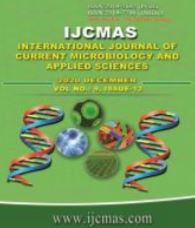


 National Academy of Agricultural Sciences (NAAS)
National Academy of Agricultural Sciences (NAAS)

|
PRINT ISSN : 2319-7692
Online ISSN : 2319-7706 Issues : 12 per year Publisher : Excellent Publishers Email : editorijcmas@gmail.com / submit@ijcmas.com Editor-in-chief: Dr.M.Prakash Index Copernicus ICV 2018: 95.39 NAAS RATING 2020: 5.38 |
The present study was conducted in Andhra Pradesh with the objective to assess the economic impact of Farmers’ Field Schools (FFSs). The total sample size was 240 comprising 120 FFS farmers and 120 non-FFS farmers selected through random sampling method from three districts of Andhra Pradesh. The double difference method was used by analysing change in performance before and after the programme for FFS farmers to the change in performance over the same period for non-FFS farmers unaffected by the programme. The farmers were interviewed by using a structured interview schedule. The study revealed that there was the increase in the yield of paddy among FFS participants was 22.42 per cent whereas it was 11.36 per cent in case of non-FFS farmers. The average per hectare gross income obtained by FFS farmers during post FFS period was Rs.29131 which was Rs.7000 higher than the income (Rs.21847.00) gained by non-FFS farmers. The increase in per hectare net income after participation in FFS among FFS farmers was Rs.14158.81, whereas it was only Rs.2220.74 among non-FFS farmers for the same period. The Gross benefit Ratio for FFS farmers during post-FFS period was 1.15 while it was 0.98 in case of non FFS farmers. The FFS farmers experienced 67.95 per cent of change while the non FFS farmers experienced 50.65 per cent change in increased gross income compared to pre-FFS period. The increase in case of non-FFS farmers was only 50.65 per cent. With respect to net income the FFS farmers had an increase of 302 per cent compared 67.16 per cent in case of non FFS farmers. With respect to chemical pesticides 18.19 per cent cost was saved by FFS farmers while non-FFS farmers incurred an additional cost of 13.83 per cent. The study has further shown additional cost incurred by FFS farmers due to use of IPM inputs and neem products. However non-FFS farmers incurred more additional cost in use of chemical fertilizers than that of FFS farmers.
 |
 |
 |
 |
 |